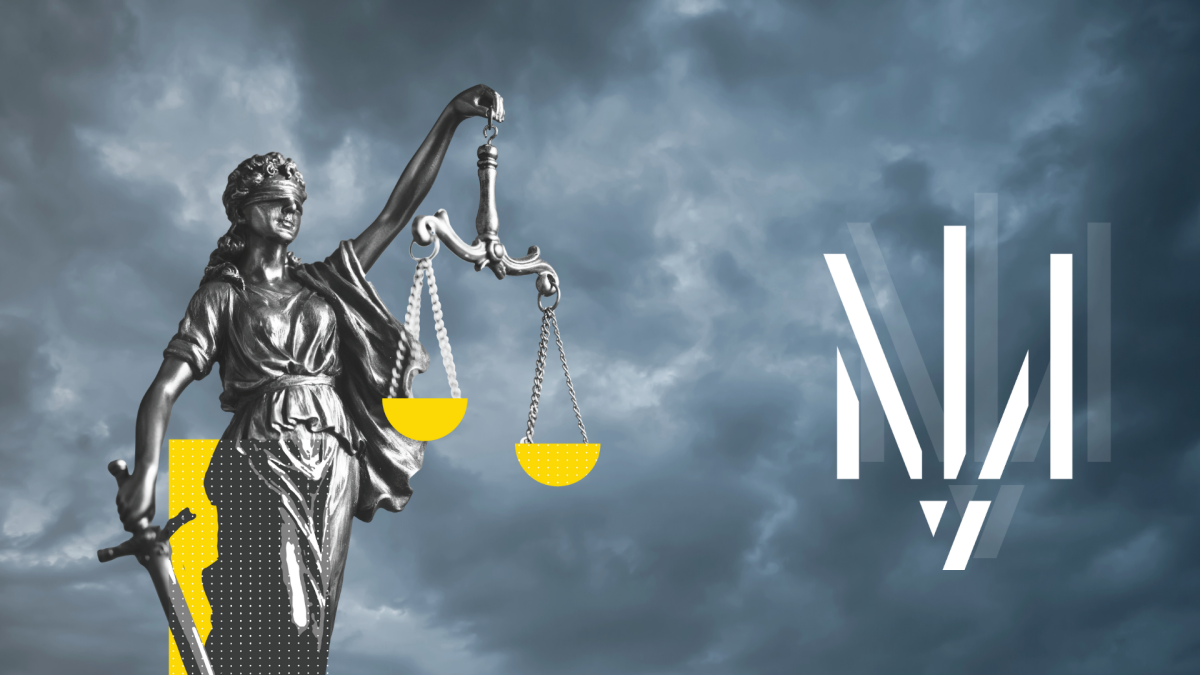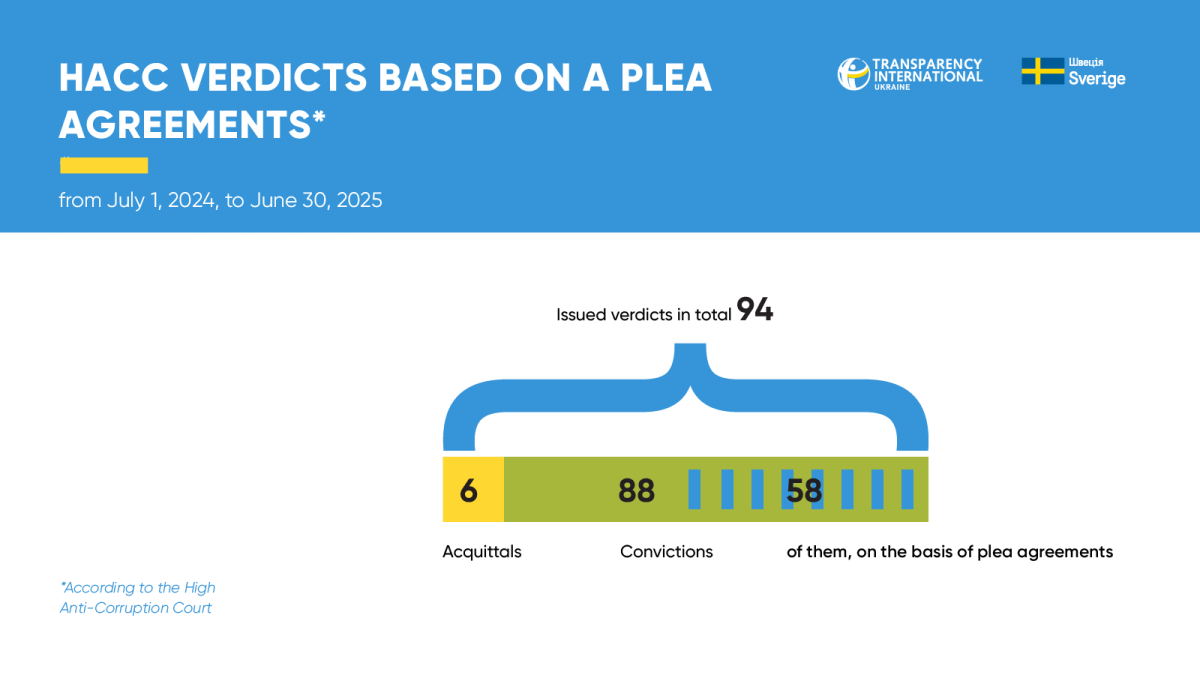

This September marks six years since the launch of the High Anti-Corruption Court. Over this time, the HACC has indeed shown that those who for years managed to evade criminal liability can still be punished for corruption.
Yet the debates of July 2025 highlighted specific problems in the court’s handling of the most high-profile cases. Despite years having passed since its establishment, we are still waiting for verdicts in many cases that date back to 2019. In some proceedings, both older and newer, defendants have simply managed to flee abroad.
How did this happen? Are all the problems due solely to external circumstances? Or could the Anti-Corruption Court itself have prevented or at least resolved part of these obstacles?
Since its inception, TI Ukraine has been closely monitoring the HACC’s work, and we recently published new monitoring results. Based on these, we will try to explain what the HACC itself can do to accelerate verdicts in top-level corruption cases.
The debates of July 2025 highlighted specific problems in the court’s handling of the most high-profile cases. Despite years having passed since its establishment, we are still waiting for verdicts in many cases that date back to 2019.
Kateryna Ryzhenko
Why the court lacks time to hear cases
We have previously warned that several high-profile cases risk being closed because the statute of limitations is expiring. Unfortunately, no positive shifts have occurred here. The statute of limitations problem is becoming increasingly critical for the HACC.
Much of this depends on Parliament, which must improve statutory regulation of limitation periods. Draft Law No. 13284, which, among other things, proposed suspending limitation periods if a defendant is mobilized, remains unconsidered. Since MPs have yet to act, the HACC must itself use every possible tool, while respecting human rights, to meet the challenge of ensuring reasonable timeframes for trials.
Still, not all judges appear willing to take this on. Otherwise, how can we explain the highly questionable decisions of the HACC Appeals Chamber? For example, in the case of Oleksandr Onyshchenko, the judges returned the case for retrial on purely formal grounds. In the so-called “DACK tapes” case, the judges went beyond the specific issues flagged by the Supreme Court. Both are highly resonant cases in which Ukrainians have been waiting for verdicts throughout the HACC’s existence.
Oleksandr Onyshchenko
Another area where the HACC could take a more proactive stance is in countering abuse of procedural rights.
Article 321 of the Criminal Procedure Code of Ukraine empowers presiding judges to maintain order, ensure the rights and obligations of participants, and steer the proceedings toward clarifying the facts while filtering out the irrelevant. Yet, too often, HACC judges refrain from exercising this authority.
This is especially challenging in cases where defendants have multiple professional defense lawyers. For a single procedural step, they may file dozens of objections and motions. For example, in one case in September 2024 alone, a lawyer filed 1,426 complaints against alleged inaction by the NABU and the SAPO with the investigating judge, and within four days in October filed 2,852 appeals against a judge’s ruling within a consolidated proceeding.
Although that case has since been closed, the example is telling. Such tactics are used in many well-known cases, with the clear purpose of dragging out proceedings until the statute of limitations expires — allowing the defendant to avoid punishment.
The court, of course, may face a storm of objections from participants. But much depends on how it explains and justifies its decisions. The clearer the court’s reasoning, and the better it aligns with the principle of the rule of law, the less resistance it is likely to provoke. Where participants behave inappropriately, the court has the authority to hold them administratively liable for contempt of court. However, this tool is rarely applied: between July 2024 and June 2025, the HACC sanctioned a defense lawyer for contempt only once, even though our experts saw many situations warranting such a response.
The recently adopted Draft Law No. 11387, which raises fines for contempt of court, may change this dynamic. We will be watching closely to see whether these new provisions are used more actively in high-profile cases.
It is also important to note that some HACC judges already demonstrate effective courtroom management practices. These should be more widely applied, as many Ukrainians are still waiting for the completion of cases and the delivery of fair verdicts.
The court, of course, may face a storm of objections from participants. But much depends on how it explains and justifies its decisions. The clearer the court’s reasoning, and the better it aligns with the principle of the rule of law, the less resistance it is likely to provoke.
Kateryna Ryzhenko
Is the HACC delivering the results ukrainians expect?
Transparency International Ukraine’s latest public opinion survey reveals that citizens remain skeptical about anti-corruption efforts. Seventy-two percent of Ukrainians view news of corruption indictments with suspicion, believing they are mainly for publicity.
But another figure is even more telling: 60% of respondents said the most important measure of effective anti-corruption is the number of corrupt officials actually punished, with imprisonment or asset confiscation. In other words, people want verdicts. And the HACC is delivering them.
While in 2019–2020 the court heard around 55–60 cases per year, in 2023, even under wartime conditions, that number rose to 84. The year 2025 is set to be a record: in just the first half of the year, the court heard 53 criminal cases and delivered 52 verdicts.
A notable trend is the increase in verdicts through plea agreements: from just one in 2019 to 35 in the first half of 2025. Recent examples include former MP Vitalii Barvinenko; Serhii Pankush, an accomplice in a bribery scheme involving an SSU officer; and lawyer Tetiana Berezhna in a bribery case at the Bilhorod-Dnistrovskyi District Court in Odesa region. Plea agreements now account for 67% of all HACC verdicts in the past six months.
Interestingly, most Ukrainians support this increase. According to the survey, 45% of citizens view plea bargains in corruption cases positively, while 23% see both pros and cons.
Still, the key in plea agreements is assessing the public interest. Put simply, the court must weigh the defendant’s interest in a lighter sentence against society’s interest in obtaining something in return.
This issue becomes especially pressing when verdicts approving plea agreements are classified, as in the cases involving Odesa Airport and Zlochevskyi.
Better and more transparent communication from the court and the prosecution on how the public interest is evaluated, particularly in cases involving top-level figures, is urgently needed. This is all the more important given the rising number of plea-based verdicts, including those kept secret. At the same time, legislation on the use of special confiscation in plea deals should be improved to ensure clearer benefits for the state.
Our latest monitoring also revealed other achievements and challenges that affect the effectiveness of the HACC and related institutions. But without doubt, the problems of expiring limitation periods and abuse of procedural rights most urgently require systemic solutions and a change in judicial approaches. The court must do everything within its power to address these issues — at least in those areas where judges already hold the levers of influence.
The key in plea agreements is assessing the public interest. Put simply, the court must weigh the defendant’s interest in a lighter sentence against society’s interest in obtaining something in return.
Kateryna Ryzhenko








